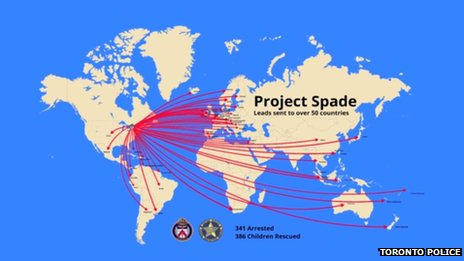Globe and Mail
November 14, 2013

Canadian company raked in $4-million from the sale of images of nude Eastern European boys, Toronto police said on Thursday, revealing details of a major international child-pornography investigation that rescued hundreds of victims.
The company, Toronto-based Azov Films, sold mail-order DVDs and streamed online videos of naked boys from Germany, Romania and Ukraine, which it marketed as naturist movies and claimed were legal in Canada and the United States.
After three years of investigation, 348 suspects were arrested in dozens of countries around the world, from Australia to Sweden to Mexico.
Sources say the investigation identified 10 to 15 children in Ukraine and Eastern Europe, who modelled for photographers connected with Azov.
In addition, police said, as Azov clients were identified around the world, police found other children who were within reach to those customers and were either physically abused or recorded in illicit videos.
At least 386 minors were removed from harm’s way, said Inspector Joanna Beaven-Desjardins, commander of the Toronto police sex crimes unit.
There were 108 arrests in Canada, including 50 in Ontario and at least 45 in Quebec. An additional 76 people were charged in the United States.
Canadian suspects who were arrested included 40 school teachers, nine doctors and nurses, nine clerics and six law-enforcement personnel, Insp. Beaven-Desjardins said.
In one case, police searched the home of a retired teacher and seized 350,000 images of sex abuse and 9,000 videos.
“We’ve worked a lot of big cases. This is by far the biggest,” one official said.
The head of the company, 42-year-old Toronto resident Brian Way, has been in custody since his May, 2011, arrest after an online undercover operation.
Records at the Finch Avenue courthouse in Toronto show that, in addition to indicting him with 23 child-pornography-related criminal counts, prosecutors took the unprecedented step of designating Azov Films as a criminal organization and charging Mr. Way with giving directions on behalf of a gang.
Mr. Way’s mother, Sandra Waslov, who is believed to be in the United States, was named as a co-conspirator, along with a German videographer, Markus Rudolph Roth. Ms. Waslov is still at large, American officials said.
According to U.S. court documents, the Azov investigation was prompted by about 20 complaints to Toronto police.
Some of the complaints came from other law-enforcement agencies, some from cyber-tipsters and even some from business rivals of Mr. Way, sources said.
Insp. Beaven-Desjardins said police first heard about Azov in 2005 but did not pursue a case against the company. The force had a better case by the time it looked at Azov again in 2010 because the videos were more clearly against the law, she said.
Azov was not exactly a covert operation: It was incorporated, held trademarks and fought for them in very public legal battles that stretched over years.
 Daily Stormer The Most Censored Publication in History
Daily Stormer The Most Censored Publication in History


